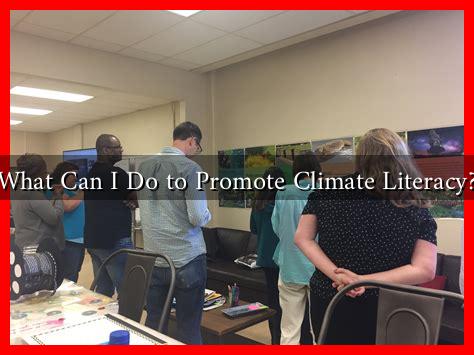-
Table of Contents
- What Can I Do to Promote Climate Literacy?
- Understanding Climate Literacy
- Strategies to Promote Climate Literacy
- 1. Educate Yourself and Others
- 2. Leverage Local Resources
- 3. Utilize Technology and Social Media
- 4. Advocate for Policy Change
- Case Studies: Successful Climate Literacy Initiatives
- Conclusion
What Can I Do to Promote Climate Literacy?
Climate literacy is essential for understanding the complexities of climate change and its impacts on our planet. As individuals, we can play a significant role in promoting climate literacy within our communities. This article explores various strategies to enhance climate literacy, empowering individuals to take informed actions against climate change.
Understanding Climate Literacy
Climate literacy refers to the understanding of the climate system, the impact of human activities on climate, and the ability to make informed decisions regarding climate-related issues. According to the National Oceanic and Atmospheric Administration (NOAA), a climate-literate person can:
- Understand the fundamental principles of Earth’s climate system.
- Recognize the impact of human activities on climate change.
- Communicate about climate change in a meaningful way.
- Make informed decisions to mitigate climate change effects.
Strategies to Promote Climate Literacy
1. Educate Yourself and Others
The first step in promoting climate literacy is to educate yourself. Stay informed about the latest climate science, policies, and solutions. Resources such as the Intergovernmental Panel on Climate Change (IPCC) provide comprehensive reports on climate change impacts and mitigation strategies. Once you are well-informed, share your knowledge with others through:
- Workshops and seminars.
- Community discussions.
- Social media platforms.
2. Leverage Local Resources
Many communities have local organizations dedicated to environmental education. Partnering with these organizations can amplify your efforts. For example, you can:
- Collaborate with schools to integrate climate education into the curriculum.
- Organize community clean-up events that also educate participants about local ecosystems.
- Host film screenings of documentaries focused on climate change, followed by discussions.
3. Utilize Technology and Social Media
In the digital age, technology can be a powerful tool for promoting climate literacy. Consider the following approaches:
- Create informative blogs or vlogs that discuss climate issues and solutions.
- Use social media to share articles, infographics, and videos that explain climate science.
- Engage in online forums and discussions to spread awareness and answer questions about climate change.
4. Advocate for Policy Change
Advocacy is a crucial component of promoting climate literacy. By engaging with policymakers, you can help shape climate-related policies. Here are some ways to get involved:
- Attend town hall meetings to voice your concerns about climate issues.
- Support local and national initiatives aimed at reducing carbon emissions.
- Encourage your local government to adopt sustainable practices and policies.
Case Studies: Successful Climate Literacy Initiatives
Several successful initiatives have demonstrated the effectiveness of promoting climate literacy:
- The Climate Reality Project: Founded by former Vice President Al Gore, this organization trains individuals to become climate leaders, equipping them with the knowledge to educate others.
- Project Drawdown: This initiative focuses on identifying and promoting solutions to climate change, providing resources for educators and community leaders.
- National Geographic’s “Planet or Plastic?”: This campaign raises awareness about plastic pollution and its impact on climate change, encouraging individuals to take action.
Conclusion
Promoting climate literacy is a collective responsibility that requires the engagement of individuals, communities, and organizations. By educating ourselves and others, leveraging local resources, utilizing technology, and advocating for policy change, we can foster a more informed society capable of addressing climate change effectively. Remember, every small action counts, and together, we can create a more sustainable future for generations to come.
For more information on climate literacy and resources, visit the NOAA Climate.gov website.

